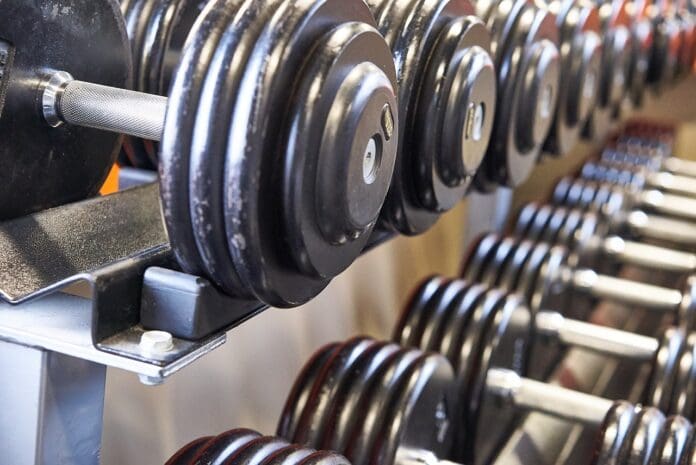Weight Lifting Workout for Beginners:
Frequency for a beginners weight lifting workout: 2-3 times per week, with at least one day of rest between sessions. beginners weight lifting workout.
Warm-Up:
- 5 to 10 minutes of light cardio ( examples: jogging, jumping jacks)
- Dynamic stretches ( examples: arm circles, leg swings)
Beginners Weight Lifting Workout:
Lower Body:
- Squats: 3 sets of 8 to12 reps
- Goblet Squats: 3 sets of 8 to12 reps
- Lunges: 3 sets of 10 to 12 reps per leg
- Calf Raises: 3 sets of 15 to 20 reps
Upper Body:
- Bench Press: 3 sets of 8 to 12 reps
- Overhead Press: 3 sets of 8 to 12 reps
- Pull-Ups: 3 sets of as many reps as you can do
- Bicep Curls: 3 sets of 8 to 12 reps
- Triceps Extensions: 3 sets of 8 to12 reps
Core:
- Plank: 3 sets of 30 to 60 seconds
- Crunches: 3 sets of 15 to20 reps
- Leg Raises: 3 sets of 15 to20 reps

Cool-Down:
- 5 to 10 minutes of static stretches (holding each stretch for 30 seconds)
Progression in Your Weight Lifting Routine:
- Gradually increase the weight or number of reps as you get stronger.
- Add new exercises as you progress.
- Consider using a spotter for heavier exercises.
Important Tips for Beginners Weight Lifting:
- Focus on proper form over weight.
- Use a weight that allows you to complete 8 to 12 repetitions with good technique.
- Listen to your body and take rest days when needed.
- You may want to consult a healthcare professional before starting any new exercise program, especially if you have any underlying health conditions.
Beginners Weight Lifting Nutrition:
As a beginner weightlifter and new to strength training and working on building lean muscle mass, one of the most important tools you’ll need to add muscle without fat is following a proper nutrition plan.
Nutrition Plan for a Weight Lifting Routine:
Also here are some nutritional tips to help you.
1 to 1.5 grams of protein per pound of bodyweight. Shoot for 25-30 grams of protein (6-8 oz) at each meal. Use quality proteins.
Additionally try to maintain your carbohydrate intake around 150 to 250 grams daily. Complex carbs fuel your body, digest slowly and will be utilized for energy.
Simple carbs are good for post workout to aid in recovery and fast absorption for muscle growth.
Further more fats should fall somewhere between 65 to 85 grams a day. Good fats give you energy and are utilized for fuel not storage.
Also all vegetables aid in digestion and give quality fiber to keep your intestinal tract functioning smoothly.
Consume at least half your bodyweight in water. On the other hand, avoid sugary drinks and diet sodas.

Supplements for Beginners Weight Lifting Routine:
For a beginner weightlifter, whey protein, creatine, and a multivitamin/mineral supplement are good options to consider. In fact, focus on a balanced nutrition plan and supplement as needed.
A More Detailed Breakdown:
Protein (Whey Protein):
Whey protein is a fast-digesting protein source that can help with muscle recovery and growth, especially after workouts.
Indeed it’s a convenient way to ensure you’re getting enough protein, which is crucial for building and repairing muscle tissue.
Creatine:
Creatine is a naturally occurring compound that can enhance strength and power output during workouts.
It’s a well-researched supplement that’s safe and effective for most people, including beginners.
Multivitamin/Mineral:
A multivitamin/mineral supplement can help fill any potential gaps in your diet, ensuring you’re getting the necessary vitamins and minerals for overall health and performance.

Other Supplements to Consider for a Beginners Weight Lifting Routine:
BCAAs (Branched-Chain Amino Acids):
BCAAs can help reduce muscle soreness and fatigue during workouts.
Omega-3 Fatty Acids:
Omega-3s can help reduce inflammation and improve overall health.
Caffeine:
Caffeine can improve focus and energy levels during workouts.
Other Important Considerations:
Focus on a balanced diet:
Supplements should complement a healthy diet, but not replace it.
Start slowly:
Don’t overload yourself with too many supplements all at once.
Consult with a healthcare professional or registered dietitian:
Before starting any new supplement regimen it may be a good idea to talk to a healthcare professional or registered dietitian.
Prioritize proper training:
Focus on learning proper form and technique before adding supplements to your routine.

